Michele Payn's Blog, page 3
January 19, 2021
Stress, choices, and farewell: Episode 78
Anyone else feeling overwhelmed? Michele and Eliz talk ranging conversation about stress, overwhelm, uncertainty, and choice in 2021. Much of their conversation is based on Eliz’s soon-to-be-released book, Stress-Proof Your Life in this final episode of the food bullying podcast. Listen in as they say farewell and help you deal with the stress of a pandemic and beyond.
Eliz shares tips to:
Tell your body it is time to let go of the stress hormone cortisolIdentify what is in your stress environmentMake, sometimes difficult, choices to rearrange your stress environment to support what is most important.They also discuss the hard choice to wrap up the Food Bullying Podcast to focus on other projects. Eliz will be working on spreading the word about her new book and Michele is considering how she can help with mental health challenges in agriculture. See https://causematters.com/mental-health-resources/ if you’re looking for resources to break the stigma around mental health.
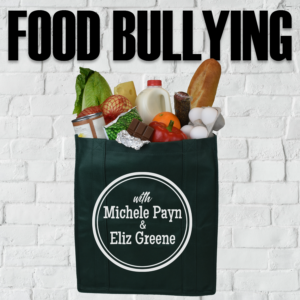 Thank you to our guests for amazing insight and listeners for following the journey through 78 episodes!
Thank you to our guests for amazing insight and listeners for following the journey through 78 episodes!
Links:
Food Bullying by Michele Payn
Stress-Proof Your Life with Eliz Greene
Food Bullying Podcast’s Facebook Page
The post Stress, choices, and farewell: Episode 78 first appeared on Cause Matters.January 12, 2021
Chemicals and doctors and food, oh my! Episode 77
Did you know soldiers used to carry flowers into battle to keep them healthy? Dr. Liza Dunn joins Michele and Eliz for a fascinating conversation about pesticides, nutrition, herbicides, and why doctors need to stay in their lane.
Liza Dunn is a mom of 3 boys and a hockey fan who loves her pets – a pug, a horse and a snake. She’s also an emergency physician and a medical toxicologist who has done relief work in Haiti and Kenya. Her work there opened her eyes to the importance of food security and vector control for public health. She is now the Medical Affairs Lead for Bayer Crop Sciences.
Key points:
Why should medical doctors “stay in their lane”?
Medical school educates about disease not nutrition or agricultureWithout a background in nutrition of ag, doctors have less information than they thinkRegistered dietitians are a good place to start for high quality nutrition informationGastroenterologist have specific training that general medical doctors and other specialist do not.As a medical doctor, why have you focused on agriculture?
Participating in humanitarian missions changed Liza’s focusShe identified malnutrition and insect born illness were the leading issuesIf you can address those issues, real progress can be madeThe vast majority of the world lives on rice, corn, and wheat – and miss out on vital micronutrientsGolden rice was modified to contain Vitamin A – and could have a significant impact to end blindness caused by malnutritionGolden rice was donated, but has been blocked by activists against GMOsWhy are pesticides important?
Insect born illness has been a problem for centuriesWar wounds in the past didn’t kill the majority of soldiers, insects didFor centuries soldiers used to carry chrysanthemums into battle, because the flowers produce natural pesticidesThree tips to overcome Food Bullying:
Try to look for healthy nutrition informationIgnore labels about what’s NOT thereGet good advice: Liza suggests: PesticideFacts.org and GeneticLiteracyProject.orgLinks:
Liza Dunn on Twitter
Food Bullying: How to Avoid Buying BS by Michele Payn
Stress-Proof Your Life with Eliz Greene
Food Bullying Podcast’s Facebook Page
The post Chemicals and doctors and food, oh my! Episode 77 first appeared on Cause Matters.January 5, 2021
Nutrition science is a puzzle
Can we trust the information we hear about nutrition? Why does nutritional advice change? Does it have to be this confusing? Michele and Eliz are joined by Registered Dietitian Nutritionist Elieke Kearns for a lively discussion about the science of nutrition and why you shouldn’t believe everything you read on Facebook, but you should trust science – especially during a pandemic.
Elieke Kearns is on a mission to make food less confusing through her nutrition research expertise, Consumer Packaged Goods (CPG) background, and deep appreciation for agriculture and food production. She loves to geek out with her fellow scientists about the complex data, regulations, and research and then share that information in simple sound bites with colleagues, friends, family, neighbors, and health care professionals to enable the innovation of new foods and drinks that are grounded in science as well as empower everyone to make the right food choice for themselves and their patients or clients.
Elieke currently works at PepsiCo as a Principal Nutrition Scientist. Previously, Elieke worked at RXBAR as the Manager of Scientific Affairs, and at the National Dairy Council as a Director of Nutrition Research. Elieke received her doctoral degree from the University of California, Davis where she completed her Ph.D. in Nutritional Biology with an emphasis in both Immunology as well as Biotechnology. She has a bachelor’s degree in Clinical Nutrition from UC Davis and is a RDN.
Key points:
Nutrition is a young science and it is complicated:
Nutrition is a giant puzzle. Every piece builds understanding.
Trends can present gaps in knowledge and research
More research fills in the gaps
All research is subject to the same standards regardless of the funding source
The data doesn’t care where the dollars come from.
Research on human volunteers requires approval to be ethical and safe
Scientific research is published in legitimate journals, replicated, and peer-reviewed.
The media often gets science wrong:
Headlines are sensational, but not accurate
Topics such as probiotics are complex and can’t be understood in a sound bite.
Claims are often repeated, but aren’t based in fact or science
Be curious about the sources of information – ask questions until you are confident.
Three tips to overcome Food Bullying:
There are no “bad” foods. Ask yourself: Does it make me happy? Does it make me feel good?
There are no quick fixes.
Be aware of misleading information – ask questions.
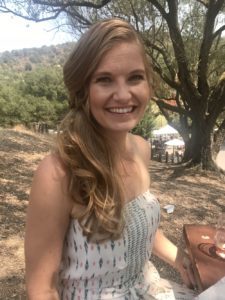 Links:
Links:
Elieke’s Website
Food Bullying: How to Avoid Buying B.S. by Michele Payn
Embrace your Heart with Eliz Greene
Food Bullying Podcast’s Facebook Page
The post Nutrition science is a puzzle first appeared on Cause Matters.December 29, 2020
Good Soil Is Like Chocolate Cake: Episode 75
Sustainable farming is a hot topic – but was does sustainable even mean? In this episode Michele and Eliz welcome regenerative farmer Steve Tucker to discuss why he changed the way he farms and why great soil is like chocolate cake.
Steve Tucker is an ag production specialist. He farms in southwest Nebraska with his wife and three kids on their diversified regenerative farm. Steve’s innovation has been important as the farm has moved from a wheat/summer fallow rotation to 14 different crops and several different ag enterprises.
Key points:
What is the difference between a sustainable farm and a regenerative farm?
Sustainable leaves us where we are.
In the past farmers used to think about what pests and weeds they needed to kill.
Regenerative think about the health of the soil and focus on how to make things better in the future.
Steve replaced summer fallow crops with marketable crops that are great for the soil.
He focuses on what the consumer wants, not what the elevator is buying.
What makes happy soil?
Plants harvest sunlight into soil
Plants make happy soil by putting carbon back into it
Lack of plants creates the need for fertilizer
Good soil is like chocolate cake
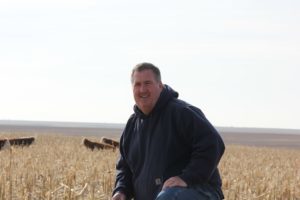 Three tips to overcome Food Bullying:
Three tips to overcome Food Bullying:
Do your own research
Know where foods come from
Understand the other side of the equation
Links:
Steve Tucker Website
Food Bullying: How to Avoid Buying BS by Michele Payn
Embrace your Heart with Eliz Greene
Food Bullying Podcast’s Facebook Page
The post Good Soil Is Like Chocolate Cake: Episode 75 first appeared on Cause Matters.December 22, 2020
Picking out ice cream, sensationalized science, & misinformation: Episode 74
Has an increase of leisure time during the pandemic made us more distrustful of science? Can we pick and choose what science we believe like we do flavors of ice cream? Michele and Eliz are joined by two scientists, Dr. Meghan Wulster- Radcliffe and Dr. Stuart Smyth to discuss science, misinformation and odd flavored ice cream.
Dr. Meghan Wulster-Radcliffe is the CEO of the American Society of Animal Science for the last 15 years, before working at ASAS, she worked in industry, government and academics. Her degrees are in Animal Science and, specifically, physiology. Over the course of her time at ASAS, she has been involved in every aspect of scientific publication for three journals, including starting two of the journals.
Dr. Stuart Smyth is an Associate Professor in the Department of Agricultural and Resource Economics at the University of Saskatchewan, where he holds the Agri-Food Innovation and Sustainability Enhancement Chair. His research focuses on sustainability, agriculture, innovation and food. Dr. Smyth publishes a weekly blog on these topics.
Key points:
Why is science not like ice cream?
the ice cream store has lots of options. You can choose your favorite flavor
science is fact-based
science increases knowledge over time
the process of science doesn’t deviate
Animal Science is dedicated to providing nutritious, sustainable food for the world
Animal Scientists use the best science to support animal welfare
How is misinformation and disinformation about agricultural science spread?
sensational titles get attention – marketing people use this to their advantage
part of the credibility of science is NOT to be sensational — Ag science is very conservative and always has to provide primary sources
Misinformation and disinformation pulls attention from science messages
It is hard to debate when one side uses emotion and the other uses data
scientists talk about statistics – which aren’t engaging for most people
journalism has changed to be more emotion driven
Why should people believe in science?
science is doing great things: human life span has increased because of better food and medicine
we have to question why we stopped trusting science. It has changed over the last 20 years. We have more leisure time and more time to think philosophically
consumers drive how we accept science
universities need to train scientists to be great communicators
Dr. Meghan’s three tips to overcome food bullying:
Look for moderation in the statement: Never all wrong or all right
Examine the sources for marketing terms
Hunt down the original sources
Dr. Stuart’s 3 tips to vet information:
Ask what information is being provided
Who is providing it?
What are they promoting? (If it is a product, be skeptical)
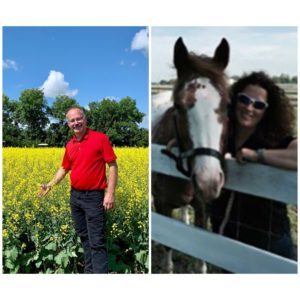 Links:
Links:
Dr. Meghan:
Dr. Stuart:
Food Bullying: How to Avoid Buying BS by Michele Payn
Embrace your Heart with Eliz Greene
Food Bullying Podcast’s Facebook Page
The post Picking out ice cream, sensationalized science, & misinformation: Episode 74 first appeared on Cause Matters.
December 15, 2020
Animal welfare, veal, and filtered milk – ask a vet! Episode 73
This episode features a wide-ranging conversation with a veterinarian about how farmers care for their animals, the challenges of being a vet, and the story of Fairlife Milk.
Dr. Marissa Hake is a veterinarian who specializes in communicating about how our food is raised. Marissa’s background has been in calf health and welfare but recently has transitioned into a new position as the Director of Animal Welfare and Sustainable Farming for Fairlife.
Key points:
What should consumers know about farmers caring for animals?
Dr. Hake sees farmers working hard every day and putting animal needs above all else.
Consumers tend to personify animals and compare them to children and pets. Farm animals are different.
Farmers care deeply for the well-being of their animals, but sometimes that care looks bad from the outside.
Dehorning calves, for example, protects other cows from injury.
What do people misunderstand about veal?
Baby animals is an emotional topic. People love cute baby animals.
Veal is not a baby cow. They are harvested when they weigh 500 to 600 pounds
Chicken and pork are harvested at younger ages.
Housing conditions have changed. It is illegal to tether a calf.
Farmers want happy, healthy cows. Cows are social.
How was Fairlife milk developed?
A farmer/veterinarian experimented with filtering milk on his farm to see if it would filter out lactose
The result was a lactose-free high-protein milk that appealed to athletes
Now there are lots of Fairlife products available in the store
Why are people scared of GMOs but not of filtered milk?
People have a point of reference for filtering something
There is too much heavy-lifting to comprehend the details of bio-engineering
What issues challenge the mental health of veterinarians?
In ag and for Vets, what people say matters and affects mental health. Most people don’t understand what they do.
Vets have a high education debt load compared to human doctors – and make less money
They deal with end-of-life decisions every day for their patients
They get push-back from people who think their services should be free
In rural communities, mental health resources are not accessible.
Three tips to overcome food bullying:
Make educated decisions
Ask the source
Do what is best for your family
Links: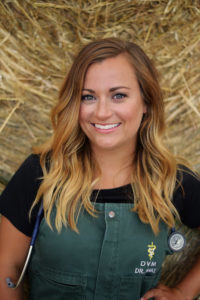
Marissa Hake Website
Food Bullying Podcast’s Facebook Page
Food Bullying: How to Avoid Buying BS by Michele Payn
Embrace your Heart with Eliz Greene
The post Animal welfare, veal, and filtered milk - ask a vet! Episode 73 first appeared on Cause Matters.
December 8, 2020
Pharmacist talks food, drugs, & rural mental health: Episode 72
Do you know your pharmacist? Does he or she know you? If not, you may be missing out on a key player in your health care. In this episode, Michele and Eliz chat with pharmacist Jason Medows about the role he plays in his rural community and why mental health resources should be treated as first aid.
Jason Medows is a pharmacist and rancher from Cuba, Missouri. He lives on a family farm with my wife Keri and their 4 sons. Just last year, he founded the podcast Ag State of Mind, which focuses on mental health in agriculture.
Key points:
The most asked question of pharmacist: “What supplements should I take?”
Jason wants people to be as drug-free as possible
Take what you need
Avoid disease through good nutrition
Nutrition wasn’t covered much in pharmacy school
Pharmacy issues in rural community
Addiction is a big issue
People are hungry to learn about nutrition, but are not fed good information
Mental health resources are not accessible
A rural pharmacist may be the only resource
A doctor will write a prescription, but it isn’t the whole solution. We have to have a holistic approach to health
We have to treat mental health resources as first aid
Mental health issues in agriculture
Jason’s own experience led him to want to help others
Culture within Ag, for men in particular, makes mental health a tough subject
Men taught to be tough, independent, and stubborn – personal health is never the priority
Jason believes we have to start treating farmers themselves as an asset that needs to be supported and protected
The podcast grew out of the desire to have rural men talk about struggling
Three tips to overcome food bullying:
Keep it simple.
Understand what your body needs and make choices based on that.
Ask a health care provider, dietitian, farmer, or rancher,
 Links:
Links:
Food Bullying: How to Avoid Buying BS by Michele Payn
Embrace your Heart with Eliz Greene
Food Bullying Podcast’s Facebook Page
The post Pharmacist talks food, drugs, & rural mental health: Episode 72 first appeared on Cause Matters.
December 1, 2020
Can food really boost your immunity? Episode 71
Registered Dietitian Nutritionist Leslie Bonci is back with the truth about immunity-boosting foods, why your gut health is essential, and, of course – lots of laughs with Michele and Eliz! There’s a reason she returns as a three-peat guest – and this episode will help you overcome food bullying during the pandemic.
Leslie Bonci is a registered dietitian and a board-certified specialist in sports dietetics. She is the nutrition consultant for the Kansas City Chiefs, Carnegie Mellon University athletics, and the Pittsburgh Ballet Theatre – and helps power a wide variety of athletes with smart nutrition. Listen in, and learn how Leslie’s food insight can help you make smart eating choices, during COVID-19 and beyond.
Key points:
There is no such thing as an immune-boosting food:
We can support our health with good nutrition, but we can’t cure a cold, flu, or other illness with food.
Your immune system is in your gut.
Carbohydrates are critically important – your microbiome flourishes when fed carbs!
Eating fermentable carbohydrates produces prebiotics
We need enough protein, divided throughout the day to produce antibodies.
Omega 3 fats are essential, too.
Whole fruits and vegetables supply fluid, calories, carbs, fiber, and disease-fighting phytonutrients.
Stocking “wealth on the shelf”
Eat well with what you have.
Canned, frozen, and dried fruits and vegetables are excellent sources of nutrition.
Stocking your shelf is great for budget-minded nutrition,
Mix canned or frozen items with fresh to stretch your food dollars: produce, dried milk, canned beans, etc.
Don’t feel you need to have the brand name.
A dollar store can also be a great source.
 Three tips to overcome food bullying
Three tips to overcome food bullying
Enjoy your food!
Everybody and every food has a place at the table.
Sometimes put your hands over your ears and say “enough”. #DebunkTheJunk
Links:
Have you liked the Food Bullying Podcast’s Facebook page? https://www.facebook.com/foodbullyingpodcast
Food Bullying: How to Avoid Buying BS by Michele Payn
Embrace your Heart with Eliz Greene
The post Can food really boost your immunity? Episode 71 first appeared on Cause Matters.
November 24, 2020
Food is sacred: how farmers help the hungry – Episode 70
What happens when the market for farm products disappears and there are hungry people in the community? In Utah it led to farmers delivering food to Navajo families, including lamb – a sacred food. Ron Gibson shares the heartwarming story the remarkable effort to inspire all Utah families to connect, succeed, and grow through the Miracle of Agriculture Foundation during COVID-19.
Ron Gibson is a sixth generation dairy farmer from Weber County, Utah. He is currently serving as the President of the Utah Farm Bureau, the largest farm & ranch organization in Utah. Its mission is to inspire ALL Utah families to connect, succeed and grow through the ‘Miracle of Agriculture’.
Key points:
The agriculture industry was expecting 2020 to be a better year than the last few, but the pandemic changed everything.
The last few years have weighed down farmers emotionally and financially.
Farmers don’t control the prices. They, for example, build a business assuming milk will be priced at $18 per pound. When the price becomes $10 per pound – farmers lose several hundred-thousand dollars per month.
COVID hit food prices plummeted. Much of food is purchased for food service and restaurants.
Grocery store shelves were empty and farmers had no market for their harvest.
Sheep ranchers were hit particularly hard since most of their harvest goes to restaurants.
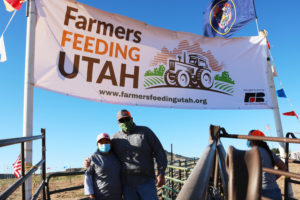 A community effort formed to help farmers and hungry people.
A community effort formed to help farmers and hungry people.
Donations to the Miracle of Agriculture Foundation are used to purchase food to deliver to hungry families.
The first project focused on easing the impact of hunger in the Navajo community.
Sheep is a sacred animal to the Navajo.
The beauty of the collaboration inspired more projects throughout the state.
Sacred money is supplying sacred food and creating a sacred community.
Three tips to understanding farmers, from a farmer.
Some of the coolest people in the world are farmers.
Farmers run their businesses without knowing what the price will be at harvest.
Farmers are independent and proud people who are the salt of the earth.
Links:
Miracle of Agriculture Foundation: https://www.miracleofag.org/
Farmers Feeding Utah Website: https://farmersfeedingutah.org/
Facebook: https://www.facebook.com/ron.gibson.1840
Instagram: instagram.com/milkman_ron
Food Bullying book by Michele Payn: http://foodbullying.com
Embrace Your Heart with Eliz Greene: http://www.embraceyourheart.com/
Food Bullying Podcast’s Facebook Page: https://www.facebook.com/foodbullyingpodcast
The post Food is sacred: how farmers help the hungry - Episode 70 first appeared on Cause Matters.
November 17, 2020
Are you one emergency away from food insecurity? Episode 69
“Many people are one emergency away from food insecurity,” says First Lady of Wyoming Jennie Gordon. She has made fighting hunger in Wyoming her mission. In this installment of our November hunger Series, we discuss how Wyoming is banning the “sandwich of shame” from school lunches and responding to food needs that tripled during COVID-19.
Jennie father was a Senior Master Sergeant who served in the navy and her mother was from Austria where she survived World War II in Vienna. Jennie has nine siblings. When her husband was appointed as Wyoming Treasurer in 2012, Jennie took over management of the Merlin Ranch full time where the the ranch has garnered national recognition for its environmental stewardship and conservation achievements as well as efforts to promote the sale of Wyoming beef worldwide. Jennie became the first lady in 2019 and launched Wyoming Hunger Initiative in October 2019. This initiative works to address hunger in Wyoming, where 1 in 6 kids and 1 in 8 adults are experiencing food insecurity.
Food is security:
Friday Food Bags given to children to bridge the 48 hours outside of school on the weekend allows a mom to work and not worry about kids having to go out to get food in a less than secure neighborhood.
Many people are living paycheck-to-paycheck and worry about an unexpected expense driving them into food insecurity.
People who are hungry didn’t put themselves in the position on purpose. We need to view food security as a hand-up not a hand-out.
Bringing compassion to school meals:
Food security has to be delivered without stigma or shame.
Many kids need support, but the parents do not qualify for free lunch.
In the past school nurses would see 50 kids per day with tummy aches. After implementing a breakfast that is delivered to all children after the bell rings, that number is reduced 80%.
Students shouldn’t be given a “sandwich of shame” if they have school lunch debt. They are given a full meal and an initiative helps parents pay off debt.
Farmers, ranchers, Department of Agriculture, hunters, and grocers unite:
There is an abundance of food, but it needs to reach people.
A partnership allows farmers and ranchers to donate food.
Hunters can donate as well.
Three tips to overcome Food Bullying:
Remember food is security.
Make it a hand up – not hand out.
How you treat the most vulnerable shows who you are.
Links:
Jennie Gordon Website: https://www.nohungerwyo.org/
Facebook: https://www.facebook.com/firstladywyoming/
Instagram: instagram.com/jennie.gordon2019
Twitter: twitter.com/JennieGordon
Food Bullying book with Michele Payn: http://foodbullying.com
Embrace Your Heart with Eliz Greene: http://www.embraceyourheart.com/
Food Bullying Podcast’s Facebook Page: https://www.facebook.com/foodbullyingpodcast
The post Are you one emergency away from food insecurity? Episode 69 first appeared on Cause Matters.



